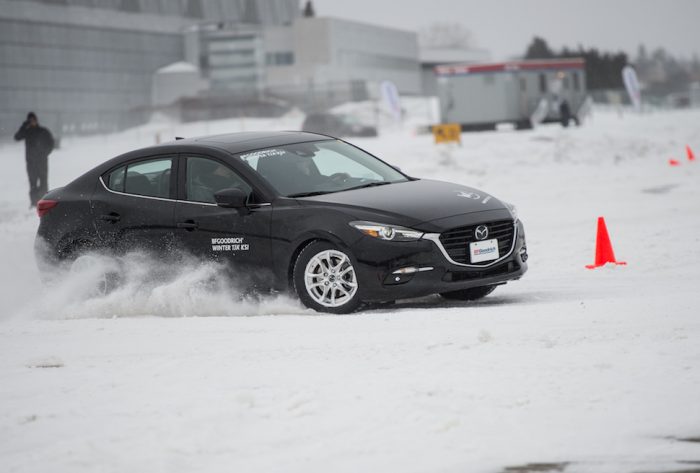This article was updated in 2024.
With fall either approaching or winding down, you may be on the fence between choosing all-weather and winter tires. Yes, all-weather tires are suitable for all seasons, but they cannot handle extreme winter conditions as efficiently as the ones designed specifically for snow and sleet.
However, all-weather tires are low-maintenance and can keep you going on the road for a few good years. Alternatively, winter tires present maximum grip (and more safety) on snowy, slushy, rainy, and icy conditions. And if you can make those winter tires last longer, that’s even better.
So, depending on your locality, which set of rubber is best for cold winters? Here’s a look at the pros and cons of all-weather tires in relation to winter tires so that you can pick the best one for yourself.
Why All-Weather Tires May Be Better Than All-Seasons During Winter

Generally, all-weather tires are slightly different from all-season tires. You can use them in both warm and cold weather, but their compound and tread favour the winters more than the all-season tires. These tires sport the mountain-and-snowflake logo, signifying a winter tire, making them eligible for insurance rebates under various regions (like Quebec and BC provinces in Canada, for instance).
All-weathers are ideal for drivers who seek all-season performance from spring to fall and also encounter occasional snowfall and cold weather conditions in the winter.
- All-Season Tires: Best suited for regions with mild winters and are a good option for drivers who experience occasional light snow. They are not designed for extreme winter conditions and can lose grip in colder temperatures.
- All-Weather Tires: Provide a versatile option for drivers who face varying weather conditions, including significant snow and ice. They offer better winter performance than all-season tires and can be used year-round, making them a convenient choice for those who want to avoid switching between winter and summer tires.
| Feature | All-Season Tires | All-Weather Tires |
|---|---|---|
| Design Purpose | Designed for moderate climates with mild winters | Designed for variable weather conditions, including snow and ice |
| Tread Compound | Harder rubber compound that performs well in warm conditions | Softer compound that remains flexible in colder temperatures |
| Tread Pattern | Typically has a less aggressive tread pattern | More aggressive tread pattern for better grip in snow and ice |
| Temperature Range | Best for temperatures above 7°C (45°F) | Suitable for a wide range of temperatures, including below freezing |
| Snow Performance | Limited performance in snow and ice | Certified for winter use, often with the Three-Peak Mountain Snowflake symbol |
| Year-Round Use | Not ideal for regions with harsh winters | Can be used year-round in regions with mild to moderate winters |
| Durability | Generally longer-lasting in warmer climates | May wear faster than all-season tires due to softer compound |
| Market Availability | More widely available and commonly used | Less common but growing in popularity, especially in Canada |
Note: we have a similar story discussing whether all-season tires are good in the snow.
Certified for winter conditions

“The advantage of a 3-peak mountain snowflake (3PMS) winter-rated all-weather tire is that it’s still certified for winter use (think safety and insurance breaks) yet also helps avoid the costly and time-consuming seasonal tire switchover to a dedicated set of winter tires for just a few colder months of the year,” explains Mark Pereira, former Director of Marketing at Sailun Tire.
Overall, we encourage winter-only tires during the snowy, cold season because of their performance advantages on the icy roads.
The company sells an affordable all-weather, winter-rated tire with a unique directional asymmetric tread pattern and specially formulated compound, delivering responsive driving confidence and safety in various temperatures throughout the 12 months of the year. It’s ideal for drivers who “seek all-season performance from spring to fall and also encounter occasional snowfall and cold weather conditions in the winter,” Mark explains.
End of the day, the ideal all-weather tire combines the best of a brand’s summer tire with the best of their winter tire technology.
Pros and Cons of All-Weather Tires During Winter

Pros
No Changing Tires
As mentioned above, the main benefit of all-weather tires over other kinds is that you don’t have to change them for any season. It would save you a lot of time and possibly money.
For those who use winter tires, properly storing them isn’t often feasible for everyone. Although some shops do offer winter tire storage for a charge, the idea of paying for something you do not use most of the year likely doesn’t fit well with most winter drivers.
Quiet Rides
Typically, all-weather tires offer quieter rides since they offer less grip, thus less friction on the road. As these tires are softer, they are compliant with most road surfaces. It is highly crucial for those offering luxury limo services.
Cons
Not Really All-Powerful
Leaving legality aside, all-weather tires could be totally impractical for you, depending on where you live in the US and Canada. In areas where the temperature drops below 7 Celsius or where snowfall occurs often, all-weather tires cannot offer the grip you get with winter tires.
Moreover, if you live in an area with lots of rain, all-weather tires are more susceptible to hydroplaning. Therefore, we suggest not installing all-weather tires in snowy, rainy, and icy surroundings.
Lower Performance
While quieter rides are an advantage for some, they come with a compromise. The lesser grip translates to lower road performance. Summer and winter rubber react better to changes in route and handling curves and turns than their all-weather counterparts. In other words, you can say all-weather tires lie between the performance of decent winter and summer tires.
Besides, all-weather tires are cheaper to buy upfront, but depending on your locality and the vehicle, you may not enjoy a lower insurance premium with these.
Takeaway
Spending your hard-earned money on all-weather or winter tires ultimately depends on your area’s driving conditions. If you live in a locale with extreme cold, snow, and rain, winter rubber will provide safer drives. However, if you reside in a milder region of America or Canada, all-weather tires will do just fine.
Overall, we encourage winter-only tires during the snowy, cold season because of their performance advantages on the icy roads. As opposed to going for used snow tires, fortunately, buying new, less expensive winter tires is a viable option.


